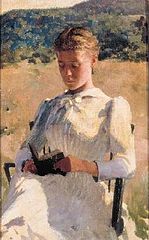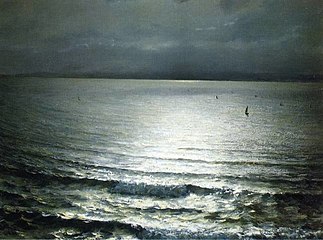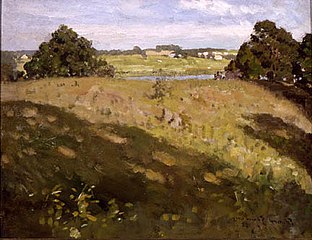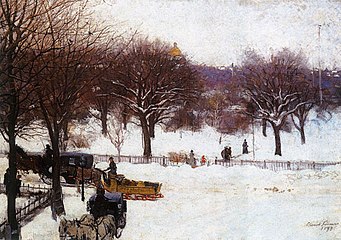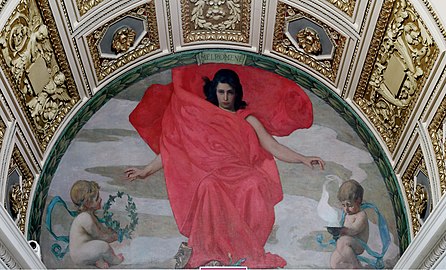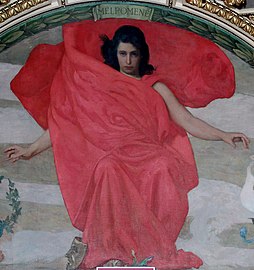Edward Simmons (painter): Difference between revisions
Randy Kryn (talk | contribs) →Gallery: add italics and removed dangling letters |
m fixed lint errors – missing end tag |
||
| (32 intermediate revisions by 14 users not shown) | |||
| Line 1: | Line 1: | ||
{{Short description|American painter (1852–1931)}} |
|||
{{other people||Edward Simmons (disambiguation){{!}}Edward Simmons}} |
{{other people||Edward Simmons (disambiguation){{!}}Edward Simmons}} |
||
{{more footnotes needed|date=August 2020}} |
|||
| ⚫ | |||
{{Infobox person |
|||
[[File:Melpomene-Simmons-Highsmith.jpeg|thumb|Edward Emerson Simmons, ''Melpomene'' (1891). [[Thomas Jefferson Building]], Washington, D.C.]] |
|||
| name = Edward Simmons |
|||
| ⚫ | |||
| image_size = 175px |
|||
| birth_date = {{birth date|1852|10|27}} |
|||
| birth_place = [[Concord, Massachusetts]] |
|||
| death_date = {{death date and age|1931|11|17|1852|10|27}} |
|||
| death_place = [[Baltimore]] |
|||
| occupation = Painter/Muralist |
|||
| spouse = {{plainlist}} |
|||
* {{marriage|Vesta Schallenberger|1883|1903|end=divorced}} |
|||
* {{marriage|Alice Ralston Morton|1903}} |
|||
{{endplainlist}} |
|||
| children = [[will Simmons|William Francis Simmons]] (1884-1949)<br />George Bradford Simmons (1886-1956) |
|||
}} |
|||
| ⚫ | |||
==Biography== |
|||
| ⚫ | |||
| ⚫ | His father was a [[Unitarianism|Unitarian]] minister. He graduated from [[Harvard College]] in 1874, and was a pupil of [[Jules Joseph Lefebvre|Lefebvre]] and [[Gustave Boulanger|Boulanger]] in [[Paris]], where he took a gold medal.<ref name="EB1911">{{EB1911|inline=y|wstitle=Simmons, Edward Emerson|volume=25|page=123}}</ref> In 1894, Simmons was awarded the first commission of the [[Municipal Art Society]], a series of murals—''Justice'', ''The Fates'', and ''The Rights of Man''—for the interior of the Criminal Courthouse at 100 Centre Street in Manhattan. This court is the criminal branch of [[New York Supreme Court]] (the [[trial court]] in New York), where many New Yorkers serve on [[jury duty]]. Later Simmons decorated the [[Waldorf Astoria New York]] hotel, the [[Library of Congress]] in [[Washington, D.C.|Washington]], and the mural series "Civilization of the Northwest" in the [[Minnesota State Capitol]] rotunda in [[Saint Paul, Minnesota|Saint Paul]].<ref name="EB1911"/> |
||
| ⚫ | |||
| ⚫ | He graduated from [[Harvard College]] in 1874, and was a pupil of Lefebvre and Boulanger in [[Paris]], where he took a gold medal. In 1894, Simmons was awarded the first commission of the [[Municipal Art Society]], a series of |
||
| ⚫ | |||
Simmons was a member of the [[Ten American Painters]], who, as a group, seceded from the [[Society of American Artists]]. He was also considered a contributor to the style known as the [[American Renaissance]], a movement after the [[American Civil War]] that stressed the relationship of architecture, painting, sculpture and interior design. |
Simmons was a member of the [[Ten American Painters]],<ref name="EB1911"/> who, as a group, seceded from the [[Society of American Artists]]. He was also considered a contributor to the style known as the [[American Renaissance]], a movement after the [[American Civil War]] that stressed the relationship of architecture, painting, sculpture and interior design. |
||
Simmons published his autobiography in 1922. |
Simmons published his autobiography in 1922. |
||
==Vandalism of Painting== |
|||
[[File:The Carpenter's Son by Edward Simmons 1889-89.jpg|thumb|150px|The Carpenter's Son by Edward Simmons 1888-89]]In 1996 his painting "The Carpenter’s Son" located in the First Unitarian Church, New Bedford, Massachusetts, was yanked from the wall and cut out from its frame. The section depicting Jesus taken cutout and removed with the rest of the painting left lying on the floor.<ref>{{Cite web|last=writer|first=David Rising, Standard-Times staff|title=Church desecration hits emotional chord|url=https://www.southcoasttoday.com/article/19961105/news/311059997|access-date=2021-03-05|website=southcoasttoday.com|language=en}}</ref> The lost section was found in 2006 rolled up behind a refrigerator when it was being removed from the congregation’s kitchen.<ref>{{Cite web|last=FRAGA|first=BRIAN|title=Church to restore slashed painting|url=https://www.southcoasttoday.com/article/20070228/NEWS/702280343|access-date=2021-03-05|website=southcoasttoday.com|language=en}}</ref> The painting was then restored and ownership transferred to the Rotch-Jones-Duff House and Garden Museum.<ref>{{Cite web|title=Our Building – The First Unitarian Church in New Bedford|url=https://uunewbedford.org/?page_id=27|access-date=2021-03-05|website=uunewbedford.org}}</ref> |
|||
== Gallery == |
== Gallery == |
||
| ⚫ | |||
{{-}} |
|||
| ⚫ | |||
File:Awaiting his return, 1884 Edward Simmons.jpg|''Awaiting his return'', 1884, private collection |
File:Awaiting his return, 1884 Edward Simmons.jpg|''Awaiting his return'', 1884, private collection |
||
File:Edward Simmons, The Reflection, oil on canvas.jpg|''The Reflection'' |
File:Edward Simmons, The Reflection, oil on canvas.jpg|''The Reflection'' |
||
File:Girl Reading, 1893 Edward Simmons.jpg|''Girl reading'' 1893, private collection |
File:Girl Reading, 1893 Edward Simmons.jpg|''Girl reading'' 1893, private collection |
||
File:Simmons12.jpg|''Wrześniowe popołudnie'', 1892 |
File:Simmons12.jpg|''Wrześniowe popołudnie'', 1892 |
||
File:Night, 1889 Edward Simmons.jpg|''Night'' |
File:Night, 1889 Edward Simmons.jpg|''Night'' |
||
File:High Sea, 1895 Edward Simmons.jpg|''High Sea'', 1895 |
File:High Sea, 1895 Edward Simmons.jpg|''High Sea'', 1895 |
||
File:SimmonsJulyAfternoon.jpg|''July Afternoon'', 1906 |
File:SimmonsJulyAfternoon.jpg|''July Afternoon'', 1906 |
||
File:Boston-Public-Gardens-Edward-Simmons.jpg|''Boston-Public-Gardens'', 1910 |
File:Boston-Public-Gardens-Edward-Simmons.jpg|''Boston-Public-Gardens'', 1910 |
||
</gallery> |
|||
=== Civilization of the Northwest Gallery === |
|||
<gallery mode="packed-hover"> |
|||
Image:Civilization of the Northwest-panel-1.png|Rotunda (Southeast Corner) |
|||
Image:Civilization of the Northwest-panel-2.png|Rotunda (Southwest Corner) |
|||
Image:Civilization of the Northwest-panel-3.png|Rotunda (Northwest Corner) |
|||
Image:Civilization of the Northwest-panel-4.png|Rotunda (Northeast Corner) |
|||
</gallery> |
</gallery> |
||
=== Melpomene mural (Library of Congress) === |
|||
| ⚫ | |||
<gallery mode=packed heights="180"> |
|||
File:Melpomene-Simmons-Highsmith.jpeg|''Melpomene'' mural (full picture, 1896), at the [[Library of Congress]] in Washington DC. Photograph (2007) by Carol Highsmith (1946–). |
|||
File:Melpomene-Simmons-Highsmith-detail-1.jpeg|''Melpomene'' mural (detail, 1896), at the [[Library of Congress]] in Washington DC. Photograph (2007) by Carol Highsmith (1946–). |
|||
</gallery> |
|||
| ⚫ | |||
| ⚫ | |||
{{Reflist}} |
|||
| ⚫ | |||
==External links== |
|||
*{{EB1911}} |
|||
{{commons category-inline|Edward Simmons}} |
|||
{{Authority control}} |
{{Authority control}} |
||
| Line 47: | Line 75: | ||
[[Category:American Impressionist painters]] |
[[Category:American Impressionist painters]] |
||
[[Category:American muralists]] |
[[Category:American muralists]] |
||
[[Category:Harvard |
[[Category:Harvard College alumni]] |
||
[[Category: |
[[Category:Académie Julian alumni]] |
||
[[Category:19th-century American male artists]] |
|||
[[Category:20th-century American male artists]] |
|||
Latest revision as of 13:14, 7 May 2024
This article includes a list of general references, but it lacks sufficient corresponding inline citations. (August 2020) |
Edward Simmons | |
|---|---|
 | |
| Born | October 27, 1852 |
| Died | November 17, 1931 (aged 79) |
| Occupation | Painter/Muralist |
| Spouses | Vesta Schallenberger
(m. 1883; div. 1903)Alice Ralston Morton
(m. 1903) |
| Children | William Francis Simmons (1884-1949) George Bradford Simmons (1886-1956) |
Edward Emerson Simmons (1852-1931) was an American Impressionist painter, remembered for his mural work.
Biography
[edit]His father was a Unitarian minister. He graduated from Harvard College in 1874, and was a pupil of Lefebvre and Boulanger in Paris, where he took a gold medal.[1] In 1894, Simmons was awarded the first commission of the Municipal Art Society, a series of murals—Justice, The Fates, and The Rights of Man—for the interior of the Criminal Courthouse at 100 Centre Street in Manhattan. This court is the criminal branch of New York Supreme Court (the trial court in New York), where many New Yorkers serve on jury duty. Later Simmons decorated the Waldorf Astoria New York hotel, the Library of Congress in Washington, and the mural series "Civilization of the Northwest" in the Minnesota State Capitol rotunda in Saint Paul.[1]
In the year 1914, he travelled with Childe Hassam to view the Arizona desert paintings of the rising California artist Xavier Martinez at his Piedmont studio.
Simmons was a member of the Ten American Painters,[1] who, as a group, seceded from the Society of American Artists. He was also considered a contributor to the style known as the American Renaissance, a movement after the American Civil War that stressed the relationship of architecture, painting, sculpture and interior design.
Simmons published his autobiography in 1922.
Vandalism of Painting
[edit]
In 1996 his painting "The Carpenter’s Son" located in the First Unitarian Church, New Bedford, Massachusetts, was yanked from the wall and cut out from its frame. The section depicting Jesus taken cutout and removed with the rest of the painting left lying on the floor.[2] The lost section was found in 2006 rolled up behind a refrigerator when it was being removed from the congregation’s kitchen.[3] The painting was then restored and ownership transferred to the Rotch-Jones-Duff House and Garden Museum.[4]
Gallery
[edit]-
Awaiting his return, 1884, private collection
-
The Reflection
-
Girl reading 1893, private collection
-
Wrześniowe popołudnie, 1892
-
Night
-
High Sea, 1895
-
July Afternoon, 1906
-
Boston-Public-Gardens, 1910
Civilization of the Northwest Gallery
[edit]-
Rotunda (Southeast Corner)
-
Rotunda (Southwest Corner)
-
Rotunda (Northwest Corner)
-
Rotunda (Northeast Corner)
Melpomene mural (Library of Congress)
[edit]-
Melpomene mural (full picture, 1896), at the Library of Congress in Washington DC. Photograph (2007) by Carol Highsmith (1946–).
-
Melpomene mural (detail, 1896), at the Library of Congress in Washington DC. Photograph (2007) by Carol Highsmith (1946–).
References
[edit]- ^ a b c One or more of the preceding sentences incorporates text from a publication now in the public domain: Chisholm, Hugh, ed. (1911). "Simmons, Edward Emerson". Encyclopædia Britannica. Vol. 25 (11th ed.). Cambridge University Press. p. 123.
- ^ writer, David Rising, Standard-Times staff. "Church desecration hits emotional chord". southcoasttoday.com. Retrieved 2021-03-05.
{{cite web}}: CS1 maint: multiple names: authors list (link) - ^ FRAGA, BRIAN. "Church to restore slashed painting". southcoasttoday.com. Retrieved 2021-03-05.
- ^ "Our Building – The First Unitarian Church in New Bedford". uunewbedford.org. Retrieved 2021-03-05.
- Edward Simmons, From Seven to Seventy: Memories of a Painter and a Yankee, with an Interruption by Oliver Herford. New York: Harper & Brothers, 1922. Oliver Herford (1863–1935) was an American author and illustrator.
External links
[edit]![]() Media related to Edward Simmons at Wikimedia Commons
Media related to Edward Simmons at Wikimedia Commons




